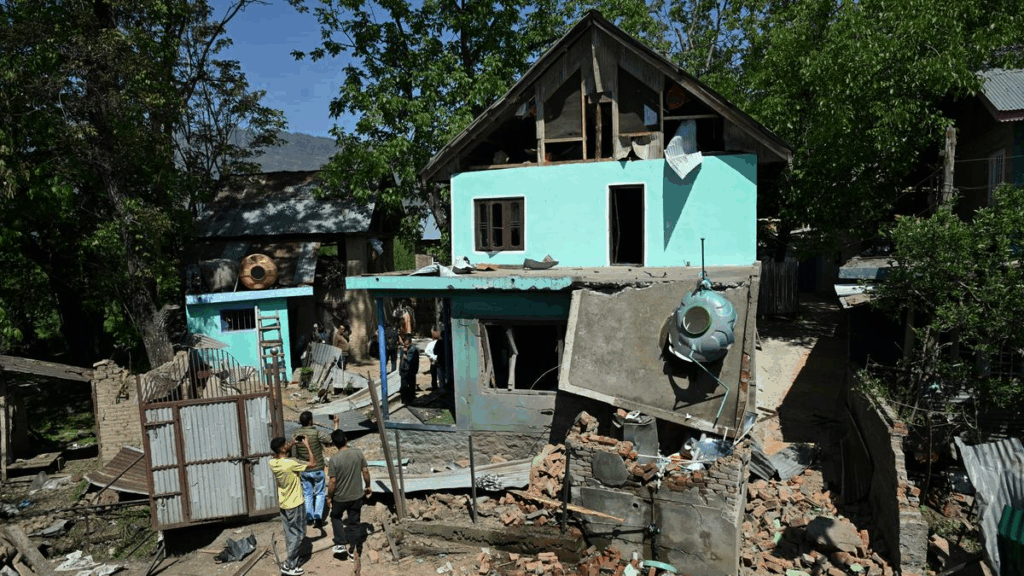The peaceful Pahalgam valley, usually resonating with scenic views and thriving tourism, was recently shocked by a gruesome terrorist attack that took the lives of 26 innocent civilians. While the country was still in mourning over the tragedy, security forces immediately initiated a strict crackdown on terror in Jammu and Kashmir (J&K). Among the strong measures was the razing of houses owned by five terrorists and their sympathizers — a stern message that the place will no longer stand for those who give shelter to extremists.

The Pahalgam Attack: A sad time
On April 22, 2025, militants who were highly loaded & opened fire on a tourist group in Pahalgam. The gruesome attack resulted in the killing of 26 civilians and injured another 20. What added to the tragedy of the situation was that many ofof the victims were honeymoon couples and families who came entirely unprepared were on vacation. The attack, which is one of the most deadly to have taken place in Kashmir over the past few years, left the country fuming & again expecting strict action against terror.
The assault was condemned at both national and international levels, with citizens calling for the perpetrators and their sympathizers to be punished to the full limit. The reply of security forces was swift and unyielding.
Security Forces’ Swift Retaliation
In the effects of the attack, J&K security forces initiated a massive security campaign against not just the militants who carried out the attack but even others who were providing them with logistical and moral support. A especially aspect of this crackdown was the razing of five houses associated with identified terrorists.

Among them were the homes of Asif Sheikh and Adil Shah in Tral, Pulwama district. Controlled blasts and heavy machines were employed by security forces to bring down these buildings.They also partly tore down the house of Hizbul Mujahideen commander Amir Khan, knocking down the boundary walls and clearing out illegal buildings.
These houses, officials said, were either constructed on government land that had been encroached upon or worked if fighter houses Destroying them, the officials hoped to disrupt the chain of infrastructure supporting terror operations to flourish in the place.
The Government’s Message: No Safe Haven for Terrorists
Jammu and Kashmir Lieutenant Governor Manoj Sinha issued a strong warning to all the residents: “If anyone gives shelter to terrorists, then his house will be demolished to the ground. There will be no compromise on it.” His statement echoed the officials firm attitude towards eliminating the terror ecosystem that has haunted the location for decades.
The demolitions are deemed weak merely punitive but preventive. Through the destruction of sites in which militants find cover, plan, and rest, officials hope to suffocate the logistical support in which terrorists subsist. The government has even called on people to report suspicious behavior and has stressed how joint responsibility by citizens is necessary for making the valley safe.

Broader Implications and Escalating Tensions
The Pahalgam crackdown is just one part of a larger policy change towards uncompromisingly dismantling terror support networks in Jammu and Kashmir. This matches Union Home Minister Amit Shah’s repeated exhortations to eliminate the “terror ecosystem” — a Large chains of people and group that support and allows terrorism, if in the form of financial patronage, ideological indoctrination, or practical help.
But these steps have further kindled hostilities with Pakistan. After the Pahalgam incident, India held Pakistan responsible for backing the militant group involved in the deadly attack. The situation at the LoC heated up, with troops from both sides firing at each other. India-Pakistan diplomatic relations, which were already tenuous, have now become even weaker.
Despite this denials by Pakistan, New Delhi has reaffirmed its determination to defend its territorial integrity plus protect it. citizens against cross-border terrorism. The recent moves in Pahalgam are a reminder that India’s strategy has evolved from a reactive stance to an active and punitive one.
